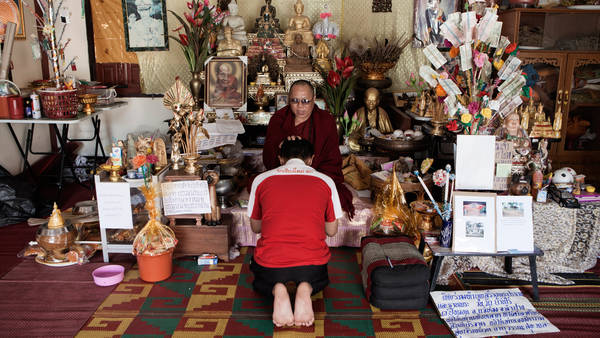Iran's fear - in a nutshell
 Tuesday, January 15, 2013 at 9:57AM
Tuesday, January 15, 2013 at 9:57AM  NYT story: "Monks Lose Relevance As Thailand Grows Richer."
NYT story: "Monks Lose Relevance As Thailand Grows Richer."
Per my post yesterday about individualism: the connectivity afforded by globalization and the wealth creation diminishes the hectoring/exemplary power of religious leaders who, under past harsher times, were better positioned to keep the social peace by encouraging a certain morality.
When globalization comes in, the socio-economic change happens in a heartbeat, and the churches/faithes/religious leaders simply can't respond fast enough.
As one Thai monk is quoted in the piece: 'Consumerism is now the Thai religion."
He's wrong, of course, and he needs to get off his ass and stop whining. New spiritual challenges naturally follow.
The monks need to summon up their inner Joel Osteen - or just find one quick.
But yeah, this is EXACTLY what Iran's mullahs fear in any genuine opening up to West/globalization. Better to pretend it's all about the nukes.











Reader Comments (5)
I think Iran's mullahs fear opening to the West a little bit less - given the mess the West made out of its two neighbours (Iraq & Afghanistan).
They'll tell Iranians that opening up to the West will turn them into another Iraq or Afghanistan - and why wouldn't they be believed?
It's a singular phenomenon, but I see it as a two faceted situation --- (entrenched) religious institutions that require a pre-determined behavior set and acquiessence to traditional, unyielding practice, and runaway mechanistic materialism. The former I welcome to the degree that God-seeking individuals honestly seek and find the Divine light, God the Father within, following the religion OF Jesus Christ. A religion that needs no church or temple no "gatekeeper" to the truth. This is a living, creative, dynamic relationship where wo/man finds God where s/he is, regardless of station or condition. Once the shackles of rigid religious leaders are loosed, mankind can seek God freely.
BUT, the huge BUT is that spiritual hunger is being dampened severely and the fire of love for the Divine is being extinguished by the love of STUFF. True enough, who am I to decry the material advancement of those long-suffering in poverty? Yet it is entirely possible that another culture will gain the world and lose its (collective) soul. It's the modern world's big temptation and potential downfall - that and scientific reductionism which accompanies materialism- the current religious paradigms simply don't easily account for this erroneous mind-set; all too often I hear that religion "is not relevant to me".
How do people of faith move through this conundrum? I have my belief, my path, my guiding light - I won't proselythize here; but conversations are welcome.
The point on Iran is not that they have to open up to the West in particular but will eventually have to interact more with the world at large. More likely it will be with China or India but when it does they will be unable to control, in the long run, the inalienable right of life, liberty and the pursuit of happiness. The Soviet Union and their imitators of the 20th century tried to play in that gray area between openness and control but eventually failed, China, Cuba and Venezuela are working in that area now and will eventually fail as will all the Middle Eastern countries who are trying to keep the wealth and control to themselves. They claim that they are only trying to protect their populations from these chaotic ideas but we all know from history that they are only protecting and enriching themselves.
Jeff Jennings, the Soviet Union failed because Saudi Arabia artificially set their own oil prices lower than the cost price at which the Soviet Union could produce the stuff, no sales, no income (even for hardline communists have to accept the principles of a global market price!). Economic collapse was inevitable after that point.
Ace Rimmer, the low oil was the straw that broke the camel's back. The real problem was the lack of a diversified economy and products other than oil that anyone outside the Soviet Union wanted. When you have all the power and control all the resources you don't like change and certainly don' t want an uppity Henry Ford or Steve Jobs type running around creating wealth and prestige for themselves and thereby threatening your status.